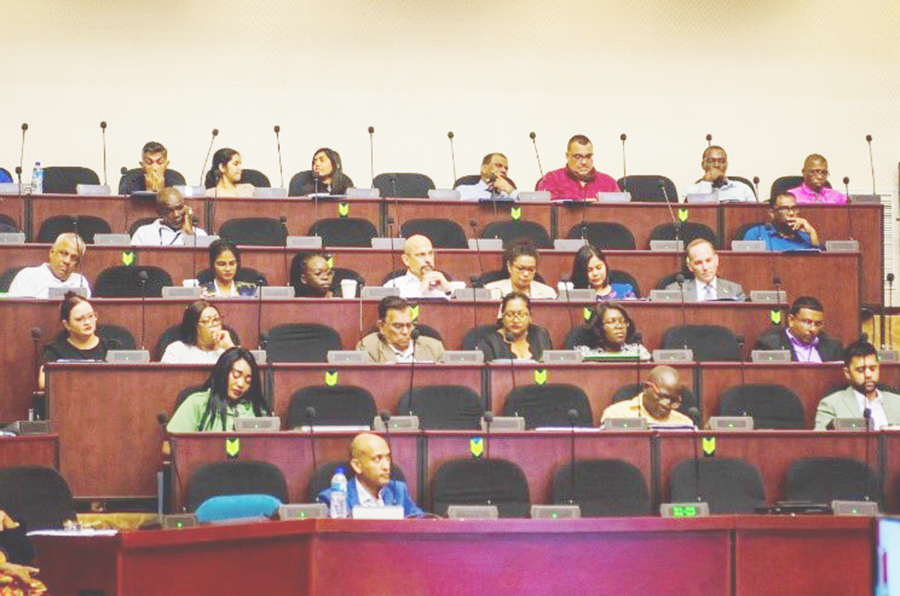Minister of Public Works, Juan Edghill has told the Guyanese diaspora that while there is a need for skilled persons to boost the economy, they must come with the understanding that the salaries won’t be the same.
Edghill was speaking yesterday at the Multi-Stakeholders Meeting on Guyana’s Labour Needs hosted by The Diaspora Unit of the Ministry of Foreign Affairs and International Cooperation at the Arthur Chung Conference Centre in Liliendaal, Georgetown.
The aim of the discussion was to understand how the diaspora could contribute to Guyana’s transformative development. The Ministry wants to do this by effectively engaging the Guyanese diaspora and recruiting skills which are needed in both the public and private sectors.
It was for this reason that the minister was named as one of the main speakers at the forum where he indicated that there must be some level of compromise between the contribution to national development and salaries.
“The bottom line particularly when you are discussing with the diaspora, is the cost to compensate for what takes place in a country where you are domiciled. People are all asking for consultancies where they can go to super level salaries. So, there is a disconnect there.
So, I would like today’s discussion while we highlight what is needed and what needs to be recruited and the rest of it, we need to discuss that kind of operation in the context of being salaried or paid in Guyana and being paid as you are in foreign, where the exchange rates put you in at a significant advantage.”
Edghill told his audience that right now the exact number of skills needed is not known to the government but shortages keep popping up everywhere. He explained that from time to time, the government is forced to import labour by granting work permits for skills as low as a driver and even the hospitality sector. He noted too that while this is so, there is a need for more persons who are skilled, equipped and trained well.
“We need quantities, which means we need more people and also need more people who are skilled, equipped and trained”
Edghill noted that Guyana’s economy isn’t like that of 10 years ago, especially with the discovery of the oil and gas sector which has put the country on the map as currently the fastest-growing economy in the world.
As such, this sector has brought a lot of wealth, and a lot of development, but it has also come at a time when Guyana has a shortage of labour due to high migration.
“In every sector in Guyana, health, we are building more hospitals, in the education sector, we are building out more schools, we are building more roads, and we are establishing more hard sea defences while we grow out more mangroves because of mangrove depletion that is taking place along the coastland. So, we need heavy-duty operators, we need people to help with traffic management when projects are going on, we need project managers, we need more skilled labourers.”
It was explained that with several major projects currently on the horizon including the bridge linking Suriname and Guyana, and the road linking Brazil, hotels, etcetera, there will be a need for more skilled labour after those projects are competed given the economic activities that will come with them.
“When that is completed, the harbour is built, the road is built; it’s not the end of what is required because those projects are to facilitate development in those areas which will require jobs again. Right now, in the tourism sector, we have about eight hotels under construction. With hotels under construction right after you will need skills in the hospitality sector and also, we will need a supply chain to ensure that those hotels are adequately serviced.”
Edghill noted that at his ministry alone, there is need more design engineers, project management professionals, quality control and testing personnel, audit engineer, etcetera.
He however acknowledged that despite the call to the diaspora, Guyana must push for skilled personnel here, some of which, he pointed out, should come from within the school system.
“So, whether we go to services, to the erection of buildings and building of roads there is a great need in every sector and how could we get this done in terms of solving the labour situation; 1) I would like to recommend more investment at the secondary level. We have the business streams, we have the science streams, and we need to have the engineering and other technical vocational streams to be developed. Not everybody is going to be a lawyer, not everybody is going to be a doctor, and not everyone will be a pilot”, he said.
The Minister also pointed out that there needs to be a centre directly hiring semi-skilled labourers when required. This, he said, will work hand in hand with the government’s push to get the skills that are needed.





